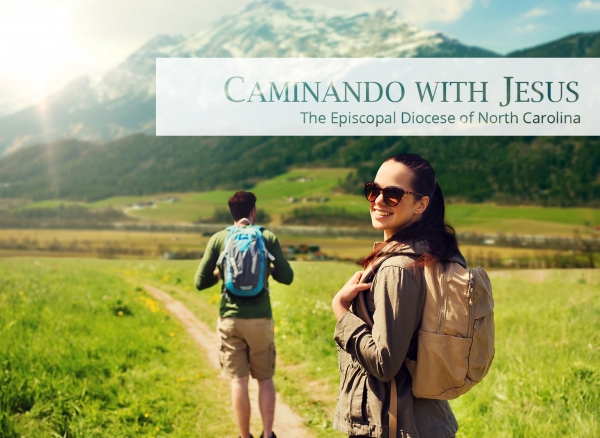CAMINANDO WITH JESUS: Casting out the ‘Crusading Spirit’

John said to Jesus, “Teacher, we saw someone casting out demons in your name, and we tried to stop him, because he was not following us.” But Jesus said, “Do not stop him; for no one who does a deed of power in my name will be able soon afterward to speak evil of me. Whoever is not against us is for us. For truly I tell you, whoever gives you a cup of water to drink because you bear the name of Christ will by no means lose the reward.
“If any of you put a stumbling block before one of these little ones who believe in me, it would be better for you if a great millstone were hung around your neck and you were thrown into the sea. If your hand causes you to stumble, cut it off; it is better for you to enter life maimed than to have two hands and to go to hell, to the unquenchable fire. And if your foot causes you to stumble, cut it off; it is better for you to enter life lame than to have two feet and to be thrown into hell. And if your eye causes you to stumble, tear it out; it is better for you to enter the kingdom of God with one eye than to have two eyes and to be thrown into hell, where their worm never dies, and the fire is never quenched.
“For everyone will be salted with fire. Salt is good; but if salt has lost its saltiness, how can you season it? Have salt in yourselves, and be at peace with one another.”
- Mark 9:38-50
Last Sunday, our reading captured the disciples’ fear and misunderstanding upon hearing yet another prediction of Jesus' impending death. The violence and brutality foretold confused and frightened the disciples. They thought, “What kind of Messiah would allow themselves to be defeated and die? Who wants to follow a LOSER?” A dying Messiah is an oxymoron. The disciples’ theological imagination was shattered. A Messiah does not die but rather, like Alexander the Great, conquers by killing others. That is the world in which Messiahship makes sense.
Unfortunately, this misconception still lingers in the theological consciousness of modern Christianity, its institutions and churches. Historian Justo L. Gonzalez asserts, “Among the many ideals that captivated the imagination of Western Christendom during the Middle Ages, no other was as dramatic, as overwhelming, or as contradictory, as was the crusading spirit[1].” The crusading spirit is a competitive spirit that makes the "other/s" enemies of Jesus. The pivotal words of this passage capture this concern. “We tried to stop him because he was not following[2] us[3].”
“Following us.” Let’s explore that. In Mark, there are 18 instances of the word “following.” All but this one refers singularly to following Jesus. Only here do we see the disciples using it, including themselves in a GROUP to be followed. “Following US.” The problem with this subtle yet significant statement is the exclusive nature of the following, which is not centered around Jesus but rather around themselves. The squabble around exclusivity and greatness consumes the disciples, making them both competitive and fearmongering. Just before this passage, they argue about who is the greatest among the disciples. Clearly this "slip of the tongue" about following US, rather than following Jesus, is not benign. It reveals, in many ways, the disciples’ orientation.
This "demon" of exclusivity and self-elevation that plagued the disciples continues to haunt the Church. Failing to follow the crucified Messiah has historically lingered on and has resulted in religious wars and bloody conflicts within. For instance, the reign of Queen Mary I, known as Bloody Mary, resulted in 280 Protestants being burned at the stake for refusing to convert to Catholicism. Countless other stories also capture this legacy and spirit we inherited from our Christian tradition. This history helps us reflect on the tendency of humans and human institutions to be egocentric and exclusive and to thirst for prestige.
In this passage, the one being stopped or excluded by the disciples seems actually to be more aligned with the spirit of the kingdom, willing to make powerful use of “the Name of Jesus.” It does not appear he does this in the name of human institution, but in the name of God. Another crucial consideration is to acknowledge that those who are willing to use Jesus’ name are joining a collaborative community, not a competitive one. The community that is willing to collaborate with the least of these and that is willing to uplift is acceptable to Jesus. They are not standing as a stumbling block but are a people who associate themselves with the other. For the disciples of Jesus, it is not enough to follow Jesus to Jerusalem; we must follow Him all the way to the cross. Followers are called to embrace cruciform discipleship and servanthood that abandons elitist conceptions of self-sufficiency, power or a holiness that excludes and undermines others.
This "demon" can only be cast out by a crucified Messiah who the disciples were taught to follow.
My concluding prayer for the people of God:
May the crusading spirit of our ancestors be cut off from us, and rather...
May we be cruciform disciples that denounce violence and oppression of any kind.
May we be salt in our society by sowing seeds of peace, love, and harmony.
May we be people who are collaborating with the marginalized and may we be willing to be crucified for it.
May we be a people that elevates God, not humankind.
The Rev. Mawethu Ncaca is the curate at St. Titus', Durham.
Tags: Caminando with Jesus
